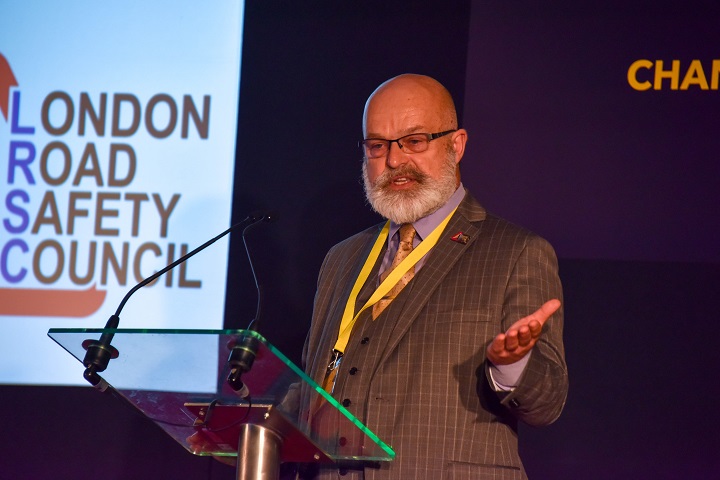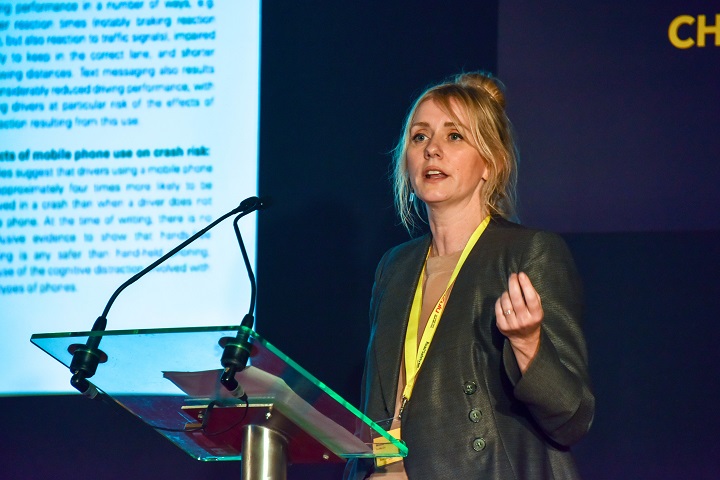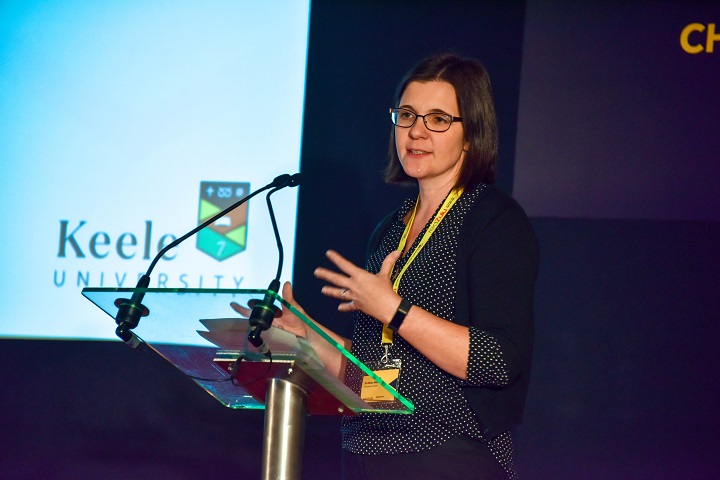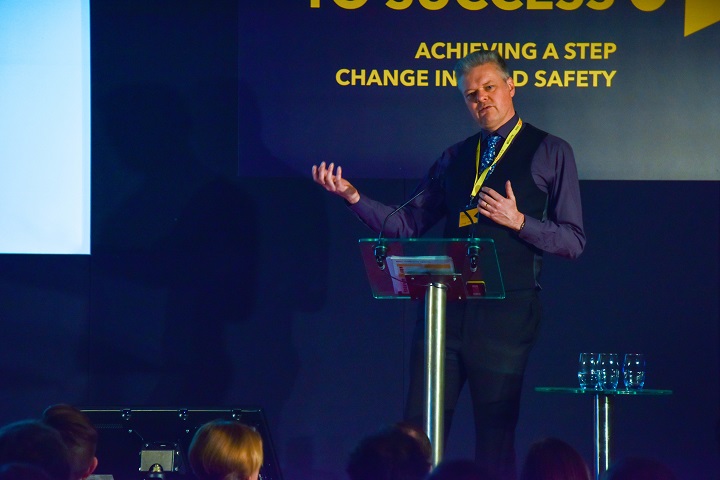
The final session of the 2018 National Road Safety Conference comprises a series of quick fire presentations, covering a wide range of topics.
Speakers:
- Nick Cowling, Programme Director, Office for Data Analytics and Service Manager for Road Safety and Transport Data, Somerset County Council
- Harry Seaton, Influencer Manager, Fluential
- Dr Helen Wells, Senior Lecturer in Criminology, University of Keele
- Nicola Wass, CEO of So-Mo-Co Ltd
- Nick Skelton & Handan Wieshmann, Assistant Director, Communities, East Sussex County Council & Senior Advisor at Behavioural Insights Team
- Professor Sally Kyd & Dr Steven Cammiss, University of Leicester
- PC Tom Fletcher, Briony Williams & Kate Bramford, West Mercia Police and University of Worcester
- James Parker, Executive Officer, London Road Safety Council
This page does not automatically refresh, click here to load the latest updates.
15.30 – James Parker, Executive Officer, London Road Safety Council
James Parker is the executive officer of the London Road Safety Council, a role he has held since 2012. Under his stewardship the organisation has grown a reputation for the support it gives to both officers and elected members, through a progressive series of training opportunities.

Presentation: Future Provision of Road Safety ETP in London
Since 2012 we’ve seen a 1/3rd reduction in the number of London RSOs
Used Road Safety Trust funding for a project looking at future ETP provision
Initial pilot scheme with six boroughs, then interviewed the remainder
Conclusions/common themes:
- Loss of expertise (senior posts gone)
- Contracting out of services (cycle training etc)
- Motorcycle casualties a real concern among authorities
- Speeds (many RSOs involved in awareness of need to reduce speeds)
- School Streets (piloting schemes where roads are closed)
- National targets (support for)
- Outputs v Outcomes
- Evaluation (so few officers with tiny budgets, not effort put into evaluation)
15.15 – PC Tom Fletcher, West Mercia Police, & Briony Williams and Kate Bramford, University of Worcester.
Briony Williams originally trained as an occupational therapist; her main area of clinical experience has been in community mental health and substance misuse services throughout the UK.
Kate Bramford originally qualified as a social worker and subsequently worked for 22 years in the Criminal Justice System as a probation officer, practice development assessor, learning & development manager and head of learning and organisational development.
Tom Fletcher is a roads policing officer with West Mercia Police, based in the operations department for Worcestershire. He has been a front line uniformed officer for nearly 10 years.
Presentation: A multiagency research project on drug driving: using the research process to increase knowledge and change attitudes
Many drug drive offenders were under 24yrs (1/3rd)
Many were surprised to fail the new drug drive test (different to drink driving)
People under estimated how long cannabis can stay in the system
71% of people realised they were not as knowledgeable as they thought they were
Project demonstrates there is scope to bridge the gap between academics & practitioners
15.00 – Professor Sally Kyd & Dr Steven Cammiss, University of Leicester
Sally Kyd is a professor of Law at the University of Leicester. Sally’s main specialism is in road traffic offences, having become interested in them through her PhD on vehicular homicide.
Steven Cammiss is senior lecturer in Law at the University of Leicester. Steven’s research interests are in the field of criminal law and justice.
Presentation: Promoting safety for vulnerable road users: assessing the investigation and enforcement of endangerment offences
Looking at causing death by dangerous or careless driving (Op Close Pass, Op Snap etc)
Dangerous driving rarely gets prosecuted in the absence of video footage
Many forces now allowing people to submit video footage – it’s good evidence (but someone ultimately needs to make the final decision about prosecution)
Cyclists focus groups
Not all that excited about enforcement – not top priority
Many had stories of reporting incidents that the police we not interested in following up.
Different forces using footage in different ways
Cyclists want cultural change – how drivers perceive them
14.45 – Nick Skelton, Assistant Director, Communities, East Sussex County Council & Handan Wieshmann Senior Advisor at Behavioural Insights Team
Nick Skelton is responsible for leading the County Council’s Customer and Communities Service, which includes road safety.
Handan Wieshmann is a senior advisor at the Behavioural Insights Team (BIT), working on home affairs and international programmes.
Presentation: Using the evidence – applying behavioural insights to road safety
Two questions – what really causes KSIs and what could we do differently to affect driver behaviour?
Looked at a decade’s worth of data & talked to RSOs and dispelled a couple of commonly held beliefs – older drivers and drivers from ‘elsewhere’ cause more KSIs
Our cognitive resource is limited
We overestimate the chances of positive outcomes
Small changes at timely moments can help change behaviour
If we are spending public money we need to be able to demonstrate we are doing so effectively
Three pilots to reduce speeding & reoffending
- Redesigned NIP letter
- ‘Operation Crackdown’ pilot
- Anniversaries pilot (letter a year after speeding offence)
14.30 – Nicola Wass, CEO of So-Mo-Co Ltd
As CEO of So-Mo-Co Ltd, Nicola has pioneered the application of behavioural insight psychology to the design and delivery of behaviour change campaigns across the UK.

Presentation: Raising awareness of the problem won’t solve it – so here’s a nudge in the right direction
We use behavioural science to change behaviour
Where do traditional approaches to road safety fall down?
And why should nudges become standard practice?
Typically road safety teams rely upon education in their interventions – but we don’t think that’s how humans think or act
Decisions are influenced by habitual behaviour – we tend to override rational thinking
People can believe one thing but behave in a completely different way
Why do they not do the things they know are right?
Coming up with an idea, implementing it and walking away is not the right thing to do
14.15 – Dr Helen Wells, Senior Lecturer in Criminology, University of Keele
Helen Wells is a senior lecturer in Criminology at the University of Keele, and a former community safety officer.

Presentation: The pros and cons of the ‘techno-fix’
Giving a cautionary talk about the use of technology in road safety
Want to be alive as to what technology can’t do
Technology often asks us to reinvent our problem
We should expect resistance to techno-fixes
We are in an arms race of technology and people finding ways around it
Dashcams offer real potential – example of tech playing to our strengths
Info passed on to human who looks at the footage in terms of the context in which it occurred.
Support from the public for what we’re doing – combining the best of both worlds
14.00 – Harry Seaton, Influencer Manager, Fluential
21-year-old Harry Seaton helps brands communicate with youth markets and engage them through the use of powerful social media influencers – people whom have built large audiences on platforms such as Instagram and YouTube.

Presentation: Influencers – and how they can help deliver road safety messages to young people
You don’t need a big following to be an influencer
An influencer has built up a level of trust among followers
Adblocker is on the rise
There is so much noise on social media – young people don’t want to see adverts
Influencers can cut through the noise and help you spread your message
A lot of influencers want to do good – they are happy to deliver important messages to create social change – they are will to work for lower fees
It’s all about the way you ask them to engage – people don’t want to read long captions
They are always happy to divulge their audience data
13.45 – Nick Cowling, Service Manager for Road Safety and Transport Data, Somerset County Council
Nick Cowling is currently the service manager for road safety and transport data at Somerset County Council. Nick has 26 years’ experience working in the field of road safety, having started out life as a road safety engineer in the north–east.

Presentation: Data Analytics SouthWest – supporting road safety planning and delivery
An opportunity for other local authorities and bodies with an interest in road safety to engage
The app provides ‘richer data’ that can be expanded
Comment on this story